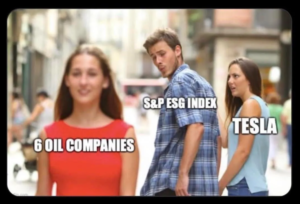Increased reporting on ESG investing has intrigued me since I noticed it a few years back. Articles have appeared with increasing frequency in virtually all industry rags about how “Advisers respond to consumer demand for ESG investments,” or “More investors demand ESG investments,” and lately, “SEC to require ESG rankings of all publicly traded companies.”
The problem is that this supposed trend directly contradicts my personal experience with investor interest in ESG investing.
ESG stands for Environmental, Social and Governance, which back in the day was called “Socially Responsible Investing,” or “ethical investing” when the focus was mostly avoiding sin stocks, weapons manufacturers or polluting companies. To be considered an ESG investment, each company must get high scores on how closely they adhere to Environmental, Social and Governance standards. We are told that high ESG scores are supposed to attract investors or managers of investor money.
With big ESG publicity of course, Wall Street responded with a blizzard of new ESG funds over the past five years. Most are still tiny wannabes.
My experience is that there is very little interest in ESG investments because they tend to underperform industry benchmarks like the S&P 500 Index over most reporting periods. During the one year ending May 20, 2022, the top 50 ESG funds as a group have performed worse than the S&P 500 by almost 7%, losing 11.75% vs the S&P 500’s loss of only 4.84% (dividends reinvested, data from Fasttrack).
About 20 years ago I had a client ask me to create an ESG portfolio for them. Since I expended a lot of time to develop the process, I thought I would advertise it, hoping to attract a few more clients. The response was zero. About 6-7 years ago, I thought I would try again and advertise the same approach on NPR in Northern Arizona. I never got one response during six months of advertising.
Considering my first-hand experiences, imagine my doubt at where all this clamor for “more ESG, more ESG, more ESG” is coming from. But no one else was talking about this anomaly, so I just let it slide. After all, what do I know? I’m just a professional investment manager.
Not being a fan of China’s dictatorial government, I was struck by a May 18, 2022 article in Yahoo Finance comparing ESG scores to China’s social credit system. If you are not familiar with this social credit system, daily activities are monitored to determine how “trustworthy” a person is in the government’s view. In China, Big Brother watches everything everyone does and says to create social credit scores. Activities like littering, traffic violations, protesting the government, frivolous spending, smoking in restricted areas and more can have negative effects on social credit scores. Get a low score and you can’t travel, can’t get the better jobs, can’t get your kids in better schools, can’t get loans. You get shut out of the good things of life. Pretty sinister stuff. Get a high score and you can get discounted utility bills, easy loan terms or fast access to travel permits.
This short NBC News video explains how this system is bending Chinese citizens to the will of the government. Watch: “Social credit system coming to China, with citizens scored on behavior.”
Here in the US, ESG scores are bending our corporations to the will of . . . actually I’m not sure who is making the rules. It must be the proverbial “they,” because there are no faces, just a PR bombardment. Who makes up the rules? It appears that the scoring can change with the political wind. And who does the scoring? Probably someone from Washington DC.
In the United States, publicly traded corporations are being extorted by the ESG movement to support political views that they have no business being involved in, quite literally. Being omitted from ESG lists suggests that a firm is a cold, ruthless bunch of capitalist polluters.

In May, Tesla was dropped from the ESG list after its founder, Elon Musk, made some political statements that angered certain groups. Tesla is the leading manufacturer of electric vehicles. You would think the ESG Emperors would love a company like Tesla. However, it was reported last week that Exxon and five other oil companies are considered ESG investment worthy companies while Tesla is not. Does that make sense? Of course not!
China’s Social Score System deprives Chinese citizens of their right to life, liberty and the pursuit of happiness. US Corporations have always had their highest level of responsibility to their shareholders like you, who as a group actually own the company. Is ESG taking away the ability of US corporations to be fiduciaries to you, forcing them to answer to politicians instead, like the Chinese social scoring system is doing there? It sure seems so to me. As investors, we should all be looking at this and shouting, “We see what you are doing and it is wrong! The ESG Emperors have no clothes!”
Intelligent people can disagree in good conscience about what is socially responsible investing or not. However, the ESG movement makes it seem that your conscience is no longer your own. It belongs to the Federal Government and their faceless rule makers.
Personally, I’d rather keep the companies I invest in focused on making money and I’ll decide where my money should be donated if I want to be political.


